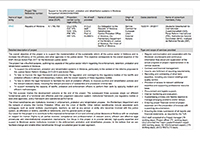
Ukraine: ongoing
Project description
The project Implementing guidelines on court procedures – Odesa was jointly designed by CILC, the Montaigne Centre for Rule of Law and Administration of Justice (Utrecht University), the Court of Amsterdam and the Ukrainian NGO The 2nd of May Group. It aims to enhance procedural discipline in several courts in the Odesa region, by developing, piloting and promoting guidelines on court procedures.
The goal of this project is to strengthen the rule of law in Ukraine, by providing support to three (pilot) courts in defining and promulgating court procedure guidelines in civil and criminal justice. These guidelines will specify how these courts use their discretionary powers in (most) standard situations, including procedures for planning, postponing and adjourning court hearings, the course and structure of these hearings, and communication about court cases. By formulating and using court procedure guidelines, arbitrary rulings can be avoided and transparency and predictability for court users can increase. The idea is that the three pilot courts will present to court users, both legal professionals and parties, more clearly what they can expect from the court and the court proceedings. Whereas currently reasons for using discretionary powers are not specified and to a large extent unclear, this project aims to specify how courts will handle proceedings and will use their powers. This is expected to contribute to a more predictable justice output, improved public transparency, less delays in proceedings and a swifter disposal of cases.
The work on this project goal will include coaching, co-drafting, testing, adjusting, and fine-tuning of these guidelines, as well as designing a communication plan. Another project strand will include peer discussions on procedural justice and the core values of the judiciary. A true culture of judicial integrity functions as an important safeguard to prevent undue influencing and corruption in the justice sector. Working level discussions among judges on the practical implications of the core values of the judiciary can help foster such a culture of integrity.
Project team

Lino Brosius
Project Director



